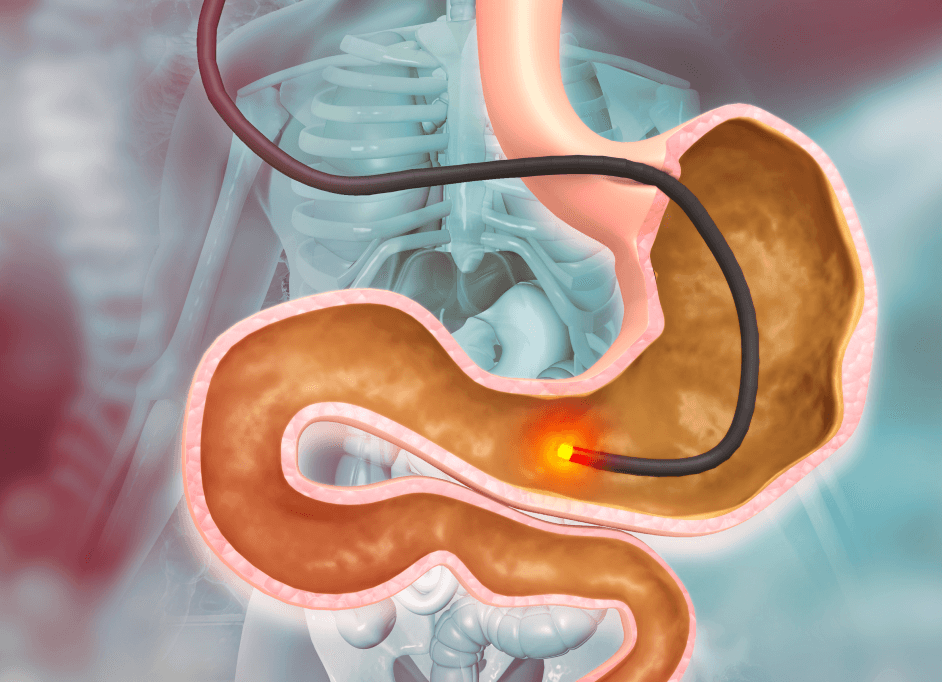

Most of us will experience challenges with our gut health at some point in our life.
Our highly experienced gastroenterologists are experts at managing problems of the gastrointestinal system. This includes the oesophagus, stomach, pancreas, bile duct, liver, small and large intestines, and anus. They perform day surgery procedures and use the latest endoscopic equipment.
When you choose private, you’ll get access to minimal wait times for treatment, and can choose your own gastroenterologist.
For endoscopy services, you’re in good hands at Campbelltown Private Hospital.


What is endoscopy?
Endoscopy is a medical procedure where a slender camera is inserted into your body by a doctor. This enables them to examine your internal organs to diagnose and treat certain medical conditions.
Endoscopy comes in various forms, such as gastroscopy, colonoscopy, and laparoscopy. The endoscope is inserted through a natural opening or a small incision in your skin.
Typically, endoscopy is conducted under sedation or general anesthesia. It's important to arrange for someone to accompany you home afterward.
For more details on how to prepare for your procedure and what to anticipate post-procedure, consult your doctor.
Conditions
Gastroscopy conditions
- Barrett’s Oesophagus
- Coeliac disease
- Gastro-Oesophageal Reflux Disease (GORD)
- Helicobacter
- Liver Disease, Cirrhosis, Portal Hypertension
- Oesophageal cancer
- Oesophageal Stricture and Dilatation
- Stomach and Duodenal Ulcers (peptic ulcers)
- Stomach cancer
Colonoscopy conditions
- Bowel cancer and polyps
- Irritable Bowel Syndrome
- Ulcerative Colitis and Crohn’s Disease

Procedures
An upper gastrointestinal (GI) endoscopy is a procedure usedto examine the inside of the oesophagus (gullet), stomach, and duodenum with aflexible viewing instrument. If your symptoms or previous tests indicate thepresence of a narrowing (stricture), a dilatation may be performed to stretchand widen the affected area. This procedure is available at CampbelltownPrivate Hospital, where our team provides expert care and support throughoutyour treatment.
Colonoscopy is a procedure that examines the large intestine, which includes the colon and rectum. It involves using a tool called a colonoscope, a thin, flexible tube equipped with a small camera and light at its tip.
Typically performed with sedation, colonoscopy is usually a day procedure. Before the actual procedure, you'll need to cleanse your bowel with a special preparation drink.
While you're comfortably sedated, the colonoscope is carefully inserted to allow your doctor to inspect your bowel. If any polyps or growths are spotted during the examination, they can be removed and sent for further analysis.
Given the high incidence of colon cancer in our society, regular colonoscopy screenings play a crucial role in prevention. It's worth noting that 99% of colon cancers originate from polyps, making their removal during colonoscopy essential. Although there's a slight risk of bleeding or perforation associated with colonoscopy, these complications are rare, occurring in less than 1% of screened patients.
Thus, colonoscopy is a beneficial and low-risk procedure for cancer prevention. Family members of individuals with colonic polyps or colon cancer are also encouraged to undergo regular screening.
Sigmoidoscopy is a quick procedure designed to examine the lower large intestine using a tool known as a colonoscope. This device is a slender, flexible tube fitted with a small camera and light at its tip.
Flexible sigmoidoscopy can be carried out with or without sedation and is typically done as a day procedure.
Before the procedure begins, a nurse will administer an enema preparation to cleanse your bowel. Then, the colonoscope is gently inserted to allow your doctor to inspect the lower third of your bowel.
If any polyps or growths are identified during the examination, they can be removed and sent for further examination.
Flexible sigmoidoscopy is considered a safe procedure for examining the lower intestine. Complications such as bleeding or perforation are extremely rare.
Upper gastrointestinal endoscopy is commonly referred to as gastroscopy. It's a procedure that examines the esophagus, stomach, and duodenum, which together make up the upper portion of the digestive tract. This procedure involves using a device called an endoscope, a thin, flexible tube equipped with a small camera and light at its tip.
Gastroscopy is typically conducted under sedation and is usually completed within a day. Prior to the procedure, you'll need to fast to ensure your stomach is empty. While you're comfortably sedated, the endoscope is gently inserted to allow your doctor to examine the upper digestive tract. Depending on the observations made during the procedure, biopsies may be taken and sent for further analysis.
Additionally, therapeutic endoscopy techniques may be employed to directly address issues such as bleeding, removal of foreign bodies, or dilation of strictures, as necessary.
GP referral
Talk to your GP for a referral to one of our gastroenterologists today.
